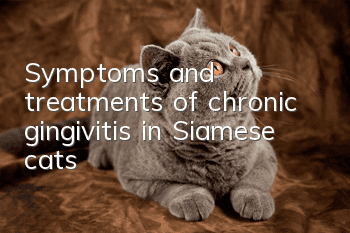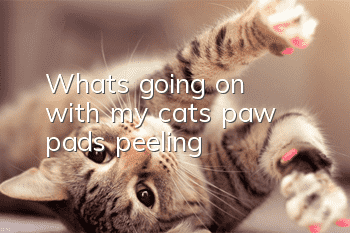Symptoms and treatments of chronic gingivitis in Siamese cats

Siamese cats are the representative of Thai pet cats. Their slender and soft body and intelligent and considerate personality are their advantages. Because of this, mainlanders also like this exotic cat breed. However, Many Chinese people will find that after raising Siamese cats for a period of time, the cats often suffer from oral ulcers, which can be temporarily relieved by medication. However, the old diseases often relapse, leaving many owners at a loss. The following is an article compiled by the editor about chronic gingivitis in Siamese cats. The symptoms and treatment methods, I hope all cat lovers will be patient and read it, it may be able to help you.
1. Common symptoms of oral inflammation in Siamese cats
1. Salivation, bad breath, pain in chewing and swallowing, excessive foaming at the mouth, sialorrhea, weight loss, and depression.
2. Redness, swelling and hyperplasia of gums, ulceration of oral mucosa, pharynx or tongue surface.
3. Missing teeth, reduced number of teeth, and loose teeth.
4. Oral mucosal congestion, erythema, pharyngeal erythema, redness, oral mucosal ulcers, blisters, and plaques.
5. Swelling, masses, pharyngeal ulcers, blisters, erosions, papules, and sores in the larynx, pharynx, and trachea.
6. Tongue protrusion, tongue protrusion, tongue ulcers, blisters, erosions, sores, vesicles, swelling and lumps in the mouth of the tongue.
2. Causes of oral inflammation in Siamese cats
1. Food hygiene
Diet, oral morphology, oral hygiene care, and oral inflammation in most animals are related to dental calculus and teeth.
2. Infection with virus
Systemic infectious diseases, such as feline HIV (FIV), feline leukemia virus (FeLV), herpes virus, calicivirus and feline distemper virus.
3. Cat diabetes
In addition, oral ulcers may also occur when diabetes, renal failure, and systemic lupus erythematosus occur; there is also a type of eosinophilic granuloma in cats that can also cause oral mucosal damage.
4. Fungal infection
Certain fungal infections can also cause lesions in the oral mucosa. It has been speculated that immune-mediated factors may be related to hypersensitivity to oral bacterial antigens.
5. Infection with feline FIV
Approximately 50% to 80% of cats infected with FIV simply exhibit chronic gingivitis or are accompanied by other diseases. And some people believe that the most common consequence of infection with feline AIDS (FIV) is chronic gingivitis.
3. Differential diagnosis of oral inflammation in Siamese cats
1. Feline herpes virus: Feline herpes virus and calicivirus are the main causes of respiratory tract infections in cats, and are accompanied by ulcerative oral infections.inflammation, painful lesions on the tongue and soft palate; symptoms of oral ulcers are common in calicivirus infection.
2. Feline HIV: Chronic gingivitis and stomatitis are usually seen during infection; ulcers can occur on the tongue, gums, mucosa, and behind the molars; they are mainly caused by immune suppression; the ulcers are very painful and cause difficulty in swallowing. , anorexia.
3. Feline distemper virus: Mainly manifests as severe gastrointestinal symptoms; oral lesions include: necrotizing gingivitis, severe ulcerative glossitis, and soft palate ulcers.
4. Treatment of chronic gingivitis in Siamese cats
Conservative treatment: Symptomatic treatment is difficult to cure. Removing necrotic tooth roots and calculus in the oral cavity according to the situation will greatly help improve the condition.
Commonly used conservative treatments are as follows:
1. Antibiotics: metronidazole, Sono, doxycycline, clindamycin, Bayli, etc., mainly kill bacteria in the oral cavity and control secondary bacterial infections.
2. Glucocorticoids: prednisolone, dexamethasone - reduce immune response, reduce further damage caused by the body's immune response, and serve the purpose of anti-inflammatory and swelling.
3. Megestrol acetate: (Mainly used to treat advanced breast cancer and advanced endometrial cancer. It also has certain effects on renal cancer, prostate cancer and ovarian cancer. It can also improve appetite and cachexia in patients with advanced tumors. ) The purpose of using this medicine here is to enhance the body's metabolism and enhance physical fitness. This drug is contraindicated in unneutered female cats as it can cause breast and ovarian cancer.
4. Levamisole: Originally a roundworm repellent, its side effect is a very good immune enhancer. Can enhance the body's immunity. To achieve the purpose of strengthening the body. Do not use in pregnant animals as it may cause fetal malformations.
5. Multivitamins: Naturally, they are indispensable nutrients for the body. When problems occur in the oral cavity, many vitamins are often deficient.
6. Thyroxine: Promote metabolism and enhance physical fitness.
7. Anti-inflammatory drugs: Reduce inflammatory response, reduce pain, redness and swelling.
8. Cyclosporine: immunosuppressant, reducing immune response.
9. Analgesic drugs: Encourage the animal to eat actively after the pain is relieved.
Surgical therapy: Many foreign literature reports that 75% of patients can be cured after removing all molars and premolars of sick cats. Since most cats with chronic gingivitis recover after tooth extraction, some scholars speculate that chronic gingivitis in cats may be a mutation of common periodontal disease.
Editor’s tip: Parents should not give the above medicines to Siamese cats by themselves without the permission of a pet doctor, because the dosage of medicines used by cats is calculated based on the cat’s condition and weight. Unprofessional parents may not be able to control the dosage easily.causing the opposite effect.
- How to read a cat's body language?
- What to do if a leopard cat suffers from postpartum hemorrhage
- Early symptoms of heart disease in cats
- My cat scratched me and there was some blood. Do I need to get vaccinated?
- What does it mean when a cat rubs its body against you?
- Why does the cat keep staring at the door in the middle of the night?
- What will happen if a cat eats too much chicken liver?
- What are the benefits of cat grass for cats?
- Can cats air dry naturally after bathing in summer?
- Symptoms of feline diabetes



